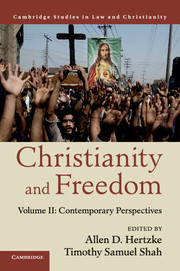Book contents
- Frontmatter
- Colophon
- Contents
- Contributing Authors
- Acknowledgments
- Introduction: Christianity and Freedom in the Contemporary World
- 1 Persecution in the Context of Religious and Christian Demography, 1970–2020
- 2 Patterns and Purposes of Contemporary Anti-Christian Persecution
- 3 Where the Spirit Leads: Global Pentecostalism and Freedom
- 4 Christianity among the Marginalized: Empowering Poor Women in India
- 5 Transnational Christian Networks for Human Dignity
- 6 The Growth and Dynamism of Chinese Christianity
- 7 Christianity and Religious Freedom in Indonesia since 1998
- 8 Christianity and Freedom in India: Colonialism, Communalism, Caste, and Violence
- 9 Vietnam: Christianity's Contributions to Freedoms and Human Flourishing in Adversity
- 10 The Challenge and Leaven of Christianity in Pakistan
- 11 Christianity and the Challenge of Religious Violence in Northern Nigeria
- 12 Copts of Egypt: Defi ance, Compliance, and Continuity
- 13 Between the Hammer and the Anvil: Indigenous Palestinian Christianity in the West Bank
- 14 Christians in the State of Israel: Between Integration and Emigration
- 15 Arab Muslim Attitudes toward Religious Minorities
- 16 They That Remain: Syrian and Iraqi Christian Communities amid the Syria Confl ict and the Rise of the Islamic State
- Index
12 - Copts of Egypt: Defi ance, Compliance, and Continuity
Published online by Cambridge University Press: 05 February 2016
- Frontmatter
- Colophon
- Contents
- Contributing Authors
- Acknowledgments
- Introduction: Christianity and Freedom in the Contemporary World
- 1 Persecution in the Context of Religious and Christian Demography, 1970–2020
- 2 Patterns and Purposes of Contemporary Anti-Christian Persecution
- 3 Where the Spirit Leads: Global Pentecostalism and Freedom
- 4 Christianity among the Marginalized: Empowering Poor Women in India
- 5 Transnational Christian Networks for Human Dignity
- 6 The Growth and Dynamism of Chinese Christianity
- 7 Christianity and Religious Freedom in Indonesia since 1998
- 8 Christianity and Freedom in India: Colonialism, Communalism, Caste, and Violence
- 9 Vietnam: Christianity's Contributions to Freedoms and Human Flourishing in Adversity
- 10 The Challenge and Leaven of Christianity in Pakistan
- 11 Christianity and the Challenge of Religious Violence in Northern Nigeria
- 12 Copts of Egypt: Defi ance, Compliance, and Continuity
- 13 Between the Hammer and the Anvil: Indigenous Palestinian Christianity in the West Bank
- 14 Christians in the State of Israel: Between Integration and Emigration
- 15 Arab Muslim Attitudes toward Religious Minorities
- 16 They That Remain: Syrian and Iraqi Christian Communities amid the Syria Confl ict and the Rise of the Islamic State
- Index
Summary
INTRODUCTION, BACKGROUND, AND METHODOLOGY
The Copts of Egypt represent the largest Christian community in an Arab state, comprising 10–15 percent of an 84 million population. The Coptic Orthodox Church of Egypt is one of the oldest indigenous churches in the world, believed to date back to 48 AD. The trajectory of the Copts has been the subject of extensive study, with much focus on their status and role as a religious minority in a Muslim majority context. This paper seeks to contribute to the literature on the positioning of Copts in relation to state, society, and church by examining
(i) the role of the Christian communities in promoting particular aspects of freedom and analysing what will be lost for state and society if the Christian community is marginalised;
(ii) the sources and severity of encroachment on freedoms affecting Copts as members of a religious group;
(iii) the coping strategies that citizens have individually and collectively espoused, including compliance, defiance, and subversion.
This chapter has two objectives. First, it examines religious diversity not only as a source of conflict, but also as a safeguard against totalitarian political and societal forces that are intolerant of pluralism and difference. In the case of Egypt, the struggle for an egalitarian political order and society by Christians via civil society activism and political parties – and in some instances the Coptic Christian churches – serves to promote freedoms not only for non-Muslim minorities, but also for minorities within Islam such as the Sufis and Shi'is, who also feel threatened by ultra-radical Islamist forces. However, in celebrating the value of religious diversity, the intention is not to conceal or negate ways in which unequal power relations have influenced citizens’ relations with the state and in society.
The second objective of the chapter is to dispel some of the prevailing myths regarding the status and position of Copts in the broader political and historical context. These myths include that the Copts are a “happy” minority, and that any discrimination or persecution is not religiously mediated but is primarily an expression of the broader structural inequalities in society. While these myths are discussed in the context of Egypt, they also permeate the narratives of Christian minorities in the region more broadly.
- Type
- Chapter
- Information
- Christianity and Freedom , pp. 338 - 371Publisher: Cambridge University PressPrint publication year: 2016
- 1
- Cited by



